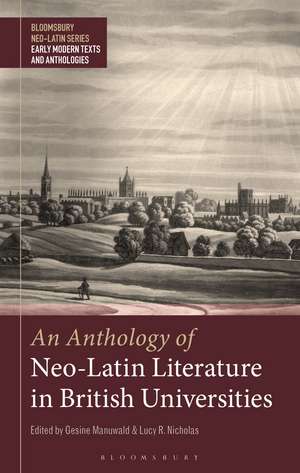An Anthology of Neo-Latin Literature in British Universities: Bloomsbury Neo-Latin Series: Early Modern Texts and Anthologies
Editat de Dr. Gesine Manuwald, Dr Lucy R. Nicholasen Limba Engleză Paperback – 13 iul 2022
| Toate formatele și edițiile | Preț | Express |
|---|---|---|
| Paperback (1) | 198.90 lei 3-5 săpt. | |
| Bloomsbury Publishing – 13 iul 2022 | 198.90 lei 3-5 săpt. | |
| Hardback (1) | 568.95 lei 6-8 săpt. | +51.69 lei 4-10 zile |
| Bloomsbury Publishing – 13 iul 2022 | 568.95 lei 6-8 săpt. | +51.69 lei 4-10 zile |
Preț: 198.90 lei
Preț vechi: 230.83 lei
-14% Nou
Puncte Express: 298
Preț estimativ în valută:
38.07€ • 41.37$ • 32.00£
38.07€ • 41.37$ • 32.00£
Carte disponibilă
Livrare economică 31 martie-14 aprilie
Preluare comenzi: 021 569.72.76
Specificații
ISBN-13: 9781350160255
ISBN-10: 1350160253
Pagini: 320
Dimensiuni: 138 x 216 x 22 mm
Greutate: 0.4 kg
Editura: Bloomsbury Publishing
Colecția Bloomsbury Academic
Seria Bloomsbury Neo-Latin Series: Early Modern Texts and Anthologies
Locul publicării:London, United Kingdom
ISBN-10: 1350160253
Pagini: 320
Dimensiuni: 138 x 216 x 22 mm
Greutate: 0.4 kg
Editura: Bloomsbury Publishing
Colecția Bloomsbury Academic
Seria Bloomsbury Neo-Latin Series: Early Modern Texts and Anthologies
Locul publicării:London, United Kingdom
Caracteristici
One of very few accessible and affordable (in paperback) bilingual readers of Neo-Latin literature, providing a representative survey of the key area of university Latin
Notă biografică
Gesine Manuwald is Professor of Latin at University College London, UK, and President of the Society for Neo-Latin Studies (SNLS). She has published a number of articles on early modern Latin literature and edited the collected volume Neo-Latin Poetry in the British Isles (2012) with Luke Houghton. She is a co-editor of the first two anthologies in the series. Lucy Nicholas is Lecturer in Latin and Ancient Greek at The Warburg Institute in London, UK. She has published on Roger Ascham and written on other early modern Latin authors, including Thomas More, Thomas Nashe and Walter Haddon. She is also a co-editor of the first two anthologies in the series.
Cuprins
List of contributors Preface Introduction (Lucy R. Nicholas, KCL, UK) Texts1 Academic Freedom on Trial in Tudor Times Stephen Gardiner (1483-1555), letter to John Cheke, 15 May 1542 (Micha Lazarus, University of Cambridge, UK) 2 Why Tudor Cambridge Needs Greek Richard Croke (1489-1558), Orationes duae (Aaron Kachuk, University of Cambridge, UK, and Benedick C.F. McDougall) 3 A Professor in Scottish Politics Andrew Melville (1545-1622), Stephaniskion (Stephen J. Harrison, University of Oxford, UK) 4 A Distinct Mode of Pastoral in Elizabethan CambridgeGiles Fletcher the Elder (c. 1546-1611), Ecloga Daphnis (Sharon van Dijk, University of Birmingham, UK) 5 Greek and Latin poetry from Cambridge on sixteenth-century questions of faithAct and Tripos verses from the 1580s and the 1590s (William M. Barton, Ludwig Boltzmann Institute for Neo-Latin Studies, Austria) 6 Happy New Year in Jacobean Oxford: Metamorphosing Ovid into Student ComedyPhilip Parsons (1594-1653), Atalanta (Elizabeth Sandis, Institute for English Studies, UK) 7 European Networks and the Reformation of the University of Edinburgh Astronomical disputations from the graduating class of 1612-16. Lecturer: William King (David McOmish, University of Glasgow, UK) 8 A Prevaricator Speech from Caroline Cambridge James Duport (1606-1679), Aurum potest produci per artem chymicam (Tommi Alho, University, Finland) 9 An Irish Panegyric on Henry Cromwell Caesar Williamson (c. 1611-1675), Panegyris in Excellentissimum Dominum, Dominum Henricum Cromwellum (Jason Harris, University College Cork, Ireland)10 Herrings, Linen and Cheese: Celebrating the Treaty of Westminster in 1654The Musarum Oxoniensium Elaiophoria (Oxford) and the Oliva Pacis (Cambridge) (Caroline Spearing, University of Exeter, UK) 11 Political Poetry from late Stuart CambridgeCambridge Poems on the Peace of 1697 (David Money, University of Cambridge, UK) Notes Bibliography Index
Recenzii
An excellent introduction to the volume as a whole lucidly describes the development of universities in early modern Britain. The material collected examines these important institutions through the lens of the languages - Latin, and to a lesser extent, Greek - in which they functioned, revealing the vital role universities played in public and political life.









